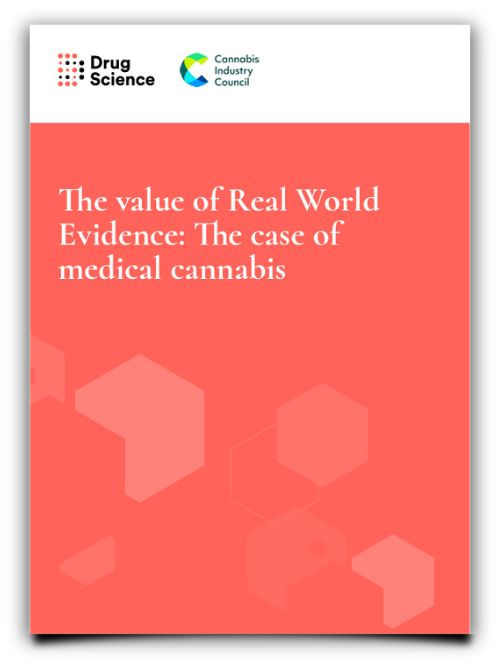Trusted guidance and resources
The value of Real World Evidence: The case of medical cannabis
Beyond stigma, cost, and a lack of knowledge within the medical sector, one of the key reasons cited as a barrier to accessing medical cannabis is lack of evidence underscoring its effectiveness, safety, and tolerability. The traditional path, randomised controlled trials, is impractical and unrealistic when it comes to medical cannabis for a variety of reasons, including high start-up costs, complex and illogical regulations, and the need to prioritise patient needs over the use of placebos in wider trials.
So, the spotlight turned to real-world evidence. Drug Science’s observational study, Project Twenty21, has amassed real-world data on over 3,500 patients successfully demonstrated the therapeutic potential of cannabis-based medicines across diverse conditions.
David Badcock, CEO of Drug Science, explains: “It is vital that this evidence is used by the medical profession to inform clinical decisions, and for the regulatory authorities to create a framework that is fit for purpose, so that patients requiring this medication can access it fairly and appropriately. It is also vital that the value of real-world evidence is understood and accepted, to remove other barriers such as stigma and cost.”
Mike Morgan Giles, CEO of the Cannabis Industry Council, is keen to highlight the practical benefits of evidence beyond clinical trails, explaining, “A more pragmatic approach would mean using these patient stories and observational and other trials, as real world evidence within the scientific assessment of cannabis as a viable medicine. The Cannabis Industry Council strongly supports this vital report into the use of real world evidence, and hopes the medical profession and regulators will engage with such an approach.”
The Value of Real World Evidence: The Case of Medical Cannabis was published in Frontiers in Psychiatry in November 2022. This document, a collaboration between Drug Science and the Cannabis Industry Council, provides 12 recommendations for policymakers and prescribers.
Executive Summary
Randomised controlled trials (RCTs) have long been considered the gold standard of medical evidence. In relation to cannabis based medicinal products (CBMPs), this focus on RCTs has led to very restrictive guidelines in the UK, which are limiting patient access.
There is general agreement that RCT evidence in relation to CBPMs is insufficient at present. As well as commercial reasons, a major problem is that RCTs do not lend themselves well to the study of whole plant medicines. One solution to this challenge is the use of real world evidence (RWE) with patient reported outcomes (PROs) to widen the evidence base. Such data increasingly highlights the positive impact medical cannabis can have on patients’ lives. This paper outlines the value of this approach which involves the study of interventions and patients longitudinally under medical care.
In relation to CBMPs, RWE has a broad range of advantages. These include the study of larger groups of patients, the use of a broader range and ratio of components of CBMPs, and the inclusion of more and rarer medical conditions. Importantly, and in contrast to RCTs, patients with significant comorbidities – and from a wider demographic profile – can also be studied, so providing higher ecological validity and increasing patient numbers, whilst offering significant cost savings.
We conclude by outlining 12 key recommendations of the value of RWE in relation to medical cannabis. We hope that this paper will help policymakers and prescribers understand the importance of RWE in relation to medical cannabis and help them develop approaches to overcome the current situation which is detrimental to patients.
Key Recommendations
Cannabis has an excellent safety profile and is an established medicine. Concerns about the perceived lack of RCT evidence are misplaced as many patient-centred approaches can be, and have already been, applied.
RWE approaches are the key to accelerate development of clinical effectiveness evidence on CBMPs across a wide range of disorders, so we need to move away from the current focus on RCTs and incorporate RWE results. Patient numbers in RWE for medical cannabis are already much larger and have greater temporal sensitivity (due to ongoing longitudinal data acquisition) than all RCTs to date combined.
RWE can provide data for specific patients that RCT results cannot. The reality of medicine is that for every patient every new treatment is an n=1 experiment. Individual patient outcome measures are the gold standard of the value of the treatment.
RWE provides more ecologically valid data as it can be acquired from a much larger range of patients than RCTs. This is because RCTs usually exclude people with co-morbid conditions, despite such patients being the majority presenting in clinical practice.
There is growing consensus amongst practitioners and regulators that RWE is essential to improve the ecological validity of the broader utility and clinical outcomes of new medicines. These advances would greatly help to optimise personal treatment protocols, supporting a move to personalised and precision based medicine- a key goal in 21st century medical practice.
The historic predominance of WEIRD (Western, Educated, Industrialized, Rich, and Democratic) participants in western medicine RCTs means their results are not representative of the general population. Basing efficacy on such a subpopulation leads to ethnic and racial disparities in healthcare. This can be actively combatted through theacquisition of more representative data acquired from the real world.
The European Medicines Agency (EMA) has recently launched their Data Analysis and eal World Interrogation Network (DARWIN EU) to deliver real world evidence on diseases, populations and the uses and performance of medicines, confirming the increasing understanding of the value of RWD.
RWE can address the need for more data to develop the current scientific evidence base. So far, there is no homogenous way of data collection on medical cannabis patients and the number of prescriptions written across countries. In Canada, the development of a large-scale database allows for side-effects to be monitored and managed more effectively. Results can then be incorporated to develop regulation and policy-making.
The available RWE evidence of CBMPs highlight their benefits in various clinical conditions. Specially for treatment-resistant patients and in selected medical conditions, CBMPs can offer an important therapeutic option.
Patient Reported Outcomes matter. GMC guidance on good medical practice makes it clear that all registered doctors must take into account and respect patients’ views and experience. Ideally, doctors should develop the evidence base together with their patients to better define indications. Areas which have significant data gaps will still require more rigorous studies and RCTs.
The collection of safety data is essential. Doctors and other HCPs need to be able to monitor the outcome of any treatment. Adverse effects must be registered and addressed,e.g., through the yellow card system in the UK or through a medicine-specific database.
Pharmacovigilance will remain important. Any harms need to be reported. Particularly attention should be paid to medical cannabis prescription and dependence. Specific medical cannabis dependence questionnaires have been developed and should be included in clinical pharmacovigilance.
Contributors
We would like to acknowledge the support from Drug Science and the Cannabis Industry Council, especially Dr Shanna Marrinan, Dr Callie Seaman, Lucy Stafford, and Dr Jose Tempero.
Download
Click the image above to download and read the document in full, or download The Value of Real World Evidence: The case of medical cannabis.

